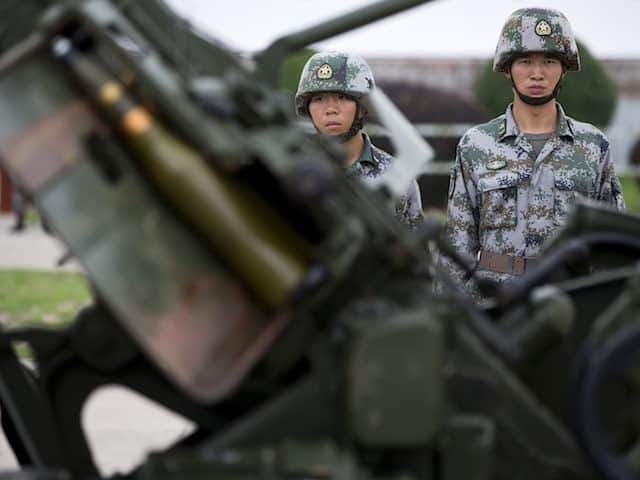China Holds Second Live-Fire Drill in Himalayas in Past Month

China’s People’s Liberation Army (PLA) recently held a live-fire drill in the Himalayas — the Chinese army’s second such exercise near the Indian border in the past month — as an ongoing boundary conflict between the two Asian neighbors continues to escalate.
The Chinese Communist Party (CCP) newspaper People’s Daily published a video of the live-fire drill days after Chinese Foreign Minister Wang Yi made a rare trip to Tibet on Friday, in which he visited China’s disputed border with India, the South China Morning Post reported on Tuesday.
Wang was the first senior CCP official to visit the Tibetan Plateau, much of which borders India, since the deadliest border conflict between the two countries in at least 45 years. That border conflict took place on June 15 in the Himalayas’ Galwan Valley, killing 20 Indian soldiers and an estimated 40 Chinese troops.
In late July, the PLA conducted live-fire drills in the “middle section of the Himalayas,” despite both China and India officially stating in recent weeks that they have largely “disengaged” from their border standoff. Tuesday’s report of yet another live-fire PLA drill in the Himalayas marks the second such Chinese military exercise on the India-China border within the past month.
Though the Tuesday report did not specify exactly when or where the latest live-fire drill took place, it said the recent exercise was carried out “at an altitude of 15,000 feet in the middle of the Himalayas.”
According to People’s Daily, “the exercise … tested the coordinated strike capability of multiple [PLA] units and put new equipment to the test in a combat situation.” During the drill, the PLA used surface-to-air missiles to shoot down target drones and simulated knocking out “the enemy’s rear command posts, missile launchers, and communication hubs” with guided bombs.
“PLA troops also launched saturated artillery fire on the enemy’s frontline positions, bunkers, and camps … a precision missile strike on remaining fortresses was carried out at the end of the drill,” the report stated.
Footage of the drill published by the newspaper showed “recently deployed artillery being used in the drill – a vehicle-mounted version of the HJ-10 anti-tank missile system, 155mm and 122mm caliber vehicle-mounted howitzers, and HQ-16 air defense missiles.”
In addition to India, Beijing has recently harassed Taiwan by staging hostile military drills near the island’s air and sea boundaries with increasing frequency in recent weeks. Though Taiwan is an independent and self-ruled democratic island, Bejing considers it a renegade province. The CCP has vowed to reunify Taiwan with China by force if necessary.
On Friday, the U.S. sold 66 new F-16V fighter jets to Taiwan as the island builds up its defenses amid increasing military aggression from Beijing. In response to the arms sale, state-run China Central Television (CCTV) aired a segment the next day, Saturday, highlighting the PLA’s Tianlei 500, or “Sky Thunder 500,” a precision-guided glide bomb. Once released from a fighter or attack jet, the bomb guides itself to target using satellite navigation. The 1,100-pound bomb carries 240 individual submunitions.
“Each dispenser can carry 240 submunitions of six types, which when released will cover more than 6,000 square meters,” a senior engineer at the weapon’s reported manufacturer, China North Industries Group Corp (NORINCO), says in the segment.
The submunition weapon is used to target airfields, which span a wide area. On Sunday, the CCP mouthpiece Global Times published an article on the Tianlei 500 segment, suggesting it was meant to send a signal to Taiwan as it purchased fighter jets from the U.S.
“Foreign media reported on Saturday that the island of Taiwan has officially signed an agreement with the U.S. to buy 66 F-16V fighter jets. Chinese mainland military analysts said that if a reunification-by-force operation breaks out, the PLA would destroy Taiwan’s airfields and command centers, giving the F-16Vs no chance to even take off, and giving those already in the air no place to land,” the newspaper wrote.
Photo: AP Photo/Andy Wong




